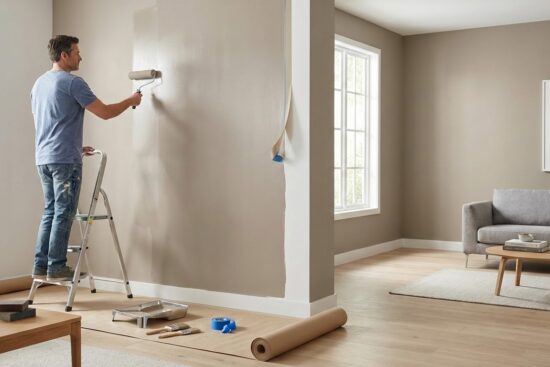Creating a space that’s both efficient and inviting starts with smart design choices. Modern solutions go beyond basic brightness—they blend seamless utility with eye-catching aesthetics. Whether you’re chopping veggies or hosting friends, the right setup ensures every corner works as hard as it looks.

This guide dives into fresh trends, energy-saving strategies, and placement tricks to elevate your space. From pendant fixtures that add personality to under-cabinet strips that brighten countertops, we’ll cover how layers of illumination transform daily tasks into enjoyable moments. Practical tips from experts help balance ambient warmth with focused task zones.
Color schemes and fixture finishes matter more than you might think. Dark countertops? You’ll need stronger output. Love sleek minimalism? Matte black hardware offers modern flair. Smart controls and motion sensors add convenience while cutting energy waste.
Key Takeaways
- Layer ambient, task, and accent fixtures for balanced coverage
- Adjust pendant height based on workspace needs and user comfort
- Use LED strips under cabinets for subtle mood and task lighting
- Match bulb intensity to your room’s color palette
- Incorporate smart tech for efficiency and ease
The Dual Role of Kitchen Lighting: Functionality & Aesthetics
Smart design merges daily utility with personal expression naturally. While bright beams help dice onions safely, softer glows turn mealtime into memory-making. This balance transforms work zones into social hubs without sacrificing efficiency.
Where Purpose Meets Personality
Task-focused fixtures like under-cabinet LED strips eliminate shadows on cutting boards. Positioned 18-24″ above counters, decorative pendants add flair while illuminating meal prep. Dimmable overheads let you shift from breakfast chaos to date-night calm with one slider.
| Lighting Type | Function | Style Tip |
|---|---|---|
| Under-Cabinet Strips | Prevents eye strain during chopping | Choose low-profile housings |
| Island Pendants | Defines workspace boundaries | Mix metallic finishes |
| Recessed Ceiling Lights | General ambient coverage | Space 4-6 feet apart |
Warmer 2700K bulbs soften stainless appliances during family dinners. Layer these with cooler 4000K spots near the sink for stain removal tasks. Smart switches let you save these combos as “movie night” or “baking mode” presets.
Remember: A space that works well should also feel welcoming. Glass globe fixtures scatter light playfully, while matte black sconces frame windows artfully. Your lighting choices tell your home’s story—make every lumen count.
Embracing Kitchen Lighting Trends for Modern Homes
Today’s homes crave designs that merge innovation with everyday ease. Current trends focus on bold fixtures and tech-forward solutions, turning functional spaces into design showcases. Let’s explore how fresh ideas reshape rooms into hubs of style and efficiency.
Statement Pendant Lights and Mixed Metal Finishes
Oversized pendants are stealing the spotlight above islands and dining nooks. Think sculptural glass globes or industrial-inspired cages—these statement pieces add drama while directing light where it’s needed. Designers recommend hanging them 30-36 inches above surfaces for optimal impact.
Mixing metals like brushed brass and matte black creates visual intrigue. A copper pendant paired with stainless steel cabinet handles adds depth without clashing. This approach works well in open-concept layouts, tying different zones together through coordinated finishes.
Integrated LED and Smart Lighting Innovations
Seamless LED strips hidden under shelves or inside crown molding offer energy-efficient task illumination. They last up to 50,000 hours and use 75% less power than traditional bulbs. Pair them with voice-controlled systems for hands-free adjustments during cooking.
Smart systems like Philips Hue let you tweak brightness and color temperature via app. Set “dinner party” scenes that dim overheads while brightening accent strips. These tech-forward options adapt to your routine, blending practicality with sleek modern aesthetics.
Kitchen Lighting Solutions for Every Area
Effective illumination transforms how we interact with our spaces. Tailored solutions address distinct zones—from prep surfaces to display shelves—ensuring each area shines both practically and stylishly. Let’s explore options that adapt to your needs.
Overhead, Recessed, and Track Lighting Options
Flush-mount fixtures work wonders in rooms with low ceilings, offering broad coverage without bulk. For a streamlined look, recessed models sit flush with surfaces, directing beams precisely where needed. Designers often space them 4-6 feet apart for balanced ambient glow.
Track systems bring flexibility to evolving layouts. Adjustable heads let you spotlight a breakfast nook today and a coffee station tomorrow. Pair these with dimmers to transition seamlessly from morning tasks to evening relaxation.
Under Cabinet and Accent Lighting Essentials
Hidden LED strips beneath upper cabinets erase shadows on countertops. Choose warm white tones for meal prep and cool whites for reading recipes. These slim profiles double as subtle mood enhancers after sunset.
Glass-front cabinet lighting turns dishware into art displays. Puck lights or tape-style LEDs highlight collectibles while adding depth to your design. Combine these with recessed options for layered functionality that wows guests.
Pro tip: Match fixture sizes to your ceiling height. Vaulted spaces handle bold chandeliers, while standard 8-foot ceilings benefit from low-profile designs. Always prioritize task zones first, then build ambiance around them.
Practical Task Lighting for Cooking and Prep Areas
Sharp knives and fresh ingredients deserve lighting that keeps up with your culinary skills. Properly positioned fixtures eliminate guesswork during chopping, sautéing, and measuring—turning rushed meals into smooth culinary experiences.
Bright Ideas for Busy Workspaces
Under-cabinet LED strips cast crisp beams directly onto countertops, revealing every herb stem and spice grain. Position them 18-24 inches above surfaces to minimize shadows. For stove tops, directional light fixtures with adjustable necks let you spotlight simmering pots without glare.
Dimmable puck lights or track systems adapt to different tasks. Brighten them for kneading dough, then soften for plating. Experts at WAC Lighting recommend 500-700 lumens per square foot in prep zones for optimal visibility.
Three rules for success:
- Mount fixtures closer to the front edge of cabinets to prevent overhead shadows
- Choose bulbs with 90+ CRI (Color Rendering Index) to distinguish between ripe and undercooked ingredients
- Install separate switches for task zones to control brightness without affecting ambient light
Glossy backsplashes? Use frosted or diffused task lighting to avoid harsh reflections. Matte surfaces handle brighter outputs. Remember: the right setup turns tedious work into efficient artistry—one perfectly diced onion at a time.
Choosing the Right Kitchen Lighting for Your Needs
How do you balance brightness and beauty in your home’s heart? Start by evaluating three illumination layers. Ambient provides overall glow, task targets work zones, and accent highlights design features. Mixing these creates a space that works hard while looking sharp.
Fixture Types Decoded
Pendants add personality above islands but need 30-36″ clearance. Recessed options offer clean lines for low ceilings. Under-cabinet strips? They’re multitaskers—brightening counters while doubling as mood enhancers.
| Fixture | Best For | Layout Tip |
|---|---|---|
| Pendant Lights | Open-concept kitchens | Use odd numbers (3 or 5) over islands |
| Recessed Lights | Small spaces | Space 4ft apart for even coverage |
| LED Strips | Galley layouts | Install under upper cabinets |
Layout-Specific Solutions
Compact galley spaces thrive with vertical light fixtures that save elbow room. Large L-shaped areas benefit from zoned systems—warm pendants above dining nooks, cool LEDs near appliances.
Checklist for success:
- Measure ceiling height before selecting hanging lights
- Choose dimmable LEDs to adapt to daily needs
- Match finish colors to cabinet hardware
Remember: Your cooking habits dictate your fixture choices. Frequent bakers need task-focused beams, while entertainers prioritize adjustable accent lights. Get this balance right, and every meal becomes a masterpiece.
Planning and Installing Your Lighting Design
A well-lit space starts with careful planning and precise execution. Begin by sketching your room layout, marking power sources and ceiling heights. This blueprint helps avoid costly mistakes and ensures your fixtures align with daily routines.

Wiring, Safety Guidelines, and Installation Tips
Always shut off the circuit breaker before touching wires—use a voltage tester to confirm no current flows. For heavy fixtures, install ceiling braces that support 2-3 times their weight. This prevents sagging or accidents over time.
Map wiring routes to minimize visible cords while maintaining access to junction boxes. LED strips save space in tight areas and pair perfectly with dimmers for adjustable brightness. The National Electrical Code recommends 15-amp circuits for most residential lighting setups.
Stuck with uneven beams? Use swivel mounts to redirect light precisely where needed. If a fixture flickers after installation, check wire connections first—loose neutrals cause 80% of intermittent issues according to Family Handyman.
For complex projects, consult licensed electricians. They’ll ensure your design meets local codes and handles the electrical load safely. Remember: patience during installation creates a system that shines for years.
Upgrading and Replacing Kitchen Light Fixtures
Outdated fixtures can drain energy and dim your space’s potential. If bulbs flicker despite replacements or shadows plague your countertops, it’s time for an upgrade. Modern solutions offer brighter outputs, smarter controls, and sleeker designs that align with current trends.
Step-by-Step Replacement Processes
Start by turning off the circuit breaker—safety first! Use a voltage tester to confirm power is cut. Unscrew the old fixture’s mounting hardware, supporting its weight as you disconnect wires. Label each wire with tape to avoid confusion during reinstallation.
Newer models often include detailed diagrams. Match colored wires (black to black, white to white) and secure them with wire nuts. “Always double-check connections before mounting,” advises a certified electrician from Angi. Tighten all screws to prevent wobbling, especially for heavy pendant fixtures.
For LED upgrades, ensure compatibility with existing dimmers. These energy-sippers use 85% less power than incandescent bulbs while lasting 25 times longer. Secure mounting plates flush against the ceiling or wall to maintain a polished look.
| Common Issues | Quick Fixes |
|---|---|
| Flickering lights | Check wire connections |
| Buzzing sounds | Replace incompatible dimmers |
| Uneven brightness | Adjust bulb wattage |
After installation, test all switches and dimmers. Consult local codes for permit requirements—some areas mandate professional help for hardwired changes. With proper care, your upgraded setup will shine safely for years.
Enhancing Home Decor with Lighting Accents
The right lighting accents act like jewelry for your home—subtle touches that elevate every detail. Imagine warm beams grazing a marble countertop or soft glows framing open shelving. These intentional choices turn ordinary surfaces into conversation starters while keeping spaces fully functional.
Complementing Cabinets, Countertops, and Finishes
Strategic placement transforms surfaces into stars. Try these ideas:
- Install LED tape lights under floating shelves to cast a warm halo over countertops
- Use adjustable sconces to spotlight a textured backsplash or artisanal tilework
- Add puck lights inside glass-front cabinets to turn dishware into curated displays
A designer from The Home Depot suggests, “Layer brightness levels like you’d layer textures—70% ambient, 20% task, 10% drama.” For dark granite surfaces, boost output to 800 lumens. Lighter quartz? Soften to 400 lumens to avoid glare.
| Surface | Lighting Technique | Style Impact |
|---|---|---|
| Countertops | Recessed under-cabinet strips | Enhances veining in stone |
| Cabinets | Interior LED pucks | Adds depth to glass doors |
| Backsplash | Directional wall lights | Highlights geometric patterns |
Keep fixtures low-profile for minimalist interiors. Brushed nickel or oil-rubbed bronze finishes tie into cabinet hardware seamlessly. Remember: Your lighting should whisper, not shout—let your surfaces take center stage.
Energy Efficiency: The Power of LED Kitchen Lighting
Modern homes shine brighter when efficiency meets elegance. LED technology revolutionizes how we brighten spaces while protecting both wallets and the planet. These fixtures blend crisp illumination with eco-friendly performance, making them a top choice for savvy homeowners.

Cost Savings and Sustainable Illumination
Switching to LEDs cuts energy use by 75% compared to traditional bulbs. A typical household saves $225+ annually, according to Energy.gov. Their 25,000-hour lifespan means fewer replacements—perfect for hard-to-reach spots above islands or cabinets.
| Feature | LED | Incandescent |
|---|---|---|
| Lifespan | 25,000 hours | 1,200 hours |
| Energy Use | 10 watts | 60 watts |
| Annual Cost* | $1.20 | $7.20 |
*Based on 3 hours/day use at $0.12/kWh
Homeowners like Sarah from Austin saw her bills drop 30% after upgrading under-cabinet strips. “The crisp light makes cooking easier, and I love the environmental win,” she shares. Dimmable options let her switch from task-focused brightness to cozy ambiance instantly.
Three tips for smart upgrades:
- Choose ENERGY STAR-certified fixtures for guaranteed efficiency
- Match color temperatures (2700K-3000K) to your home’s style
- Install motion sensors in pantries to reduce wasted energy
Pair LEDs with smart controls for maximum savings. Voice-activated systems adjust brightness hands-free during meal prep. Remember: Quality matters—invest in reputable brands for consistent performance that lasts decades, not just years.
Innovative Lighting Ideas for Contemporary Kitchens
Revolutionize your cooking space with tech-savvy solutions that dazzle and deliver. Today’s designs blend voice-activated controls with artistic arrangements, turning functional areas into interactive showcases. Imagine adjusting brightness via app while geometric pendants cast playful shadows across your counter—innovation meets imagination here.
Where Tech Meets Tactile Design
Smart systems like Lutron’s Caséta let you create “sunrise mode” for morning coffee or “dinner party” presets with one tap. These wireless setups sync with Alexa and Google Home, adapting to your rhythm effortlessly. A 2023 Houzz survey shows 68% of remodelers now prioritize smart-ready fixtures for future-proof flexibility.
| Feature | Traditional Systems | Smart Solutions |
|---|---|---|
| Control Method | Wall switches | Voice/app automation |
| Energy Use | Fixed output | Adaptive dimming |
| Customization | Single settings | Unlimited scenes |
Cluster three mismatched pendant lighting pieces above islands for gallery-worthy drama. Try pairing a matte black cone with a brass orb and frosted globe—this trio adds depth while directing light precisely. Designers at CB2 recommend varying heights by 6-8 inches for dynamic visual flow.
In Seattle, a renovated loft uses color-changing LED strips under floating shelves. By day, they provide task beams for meal prep. By night, they shift to amber tones, creating a cozy atmosphere for wine tastings. Homeowner Mia shares, “Guests always ask how we made our space feel both high-tech and welcoming.”
Don’t fear experimentation. Swap out basic recessed fixtures for hexagonal track lights that follow your kitchen’s angles. Mix industrial sconces with organic-shaped pendants to balance raw and refined elements. Your space should reflect your personality—one cleverly placed bulb at a time.
Kitchen Lighting: Trends, Tips, and Techniques
Spaces that multitask demand smarter illumination solutions. As homes evolve into hybrid hubs, design choices now prioritize flexibility—bright enough for spreadsheets by day, warm enough for family game night by evening.
Adapting to Evolving Home and Work Space Needs
Adjustable pendants reign supreme in 2024. These fixtures let you modify height and brightness over time, catering to meal prep or video calls. Designers recommend pairing three clustered lights above islands—they define zones while adding visual rhythm.
Hidden LEDs now serve dual roles. Install them under toe kicks or inside open shelving to:
- Reduce eye strain during long work sessions
- Create subtle pathways for nighttime snacks
- Highlight decorative backsplashes without glare
For family-centric homes, layered controls are key. Smart dimmers let parents brighten homework corners while keeping dinner areas softly lit. A recent Houzz study found 73% of renovators prioritize customizable systems that adapt to changing needs.
Transform your island into a command center with these steps:
- Mount plug-in pendants 34″ above countertops
- Add USB-integrated outlets for device charging
- Use warm-white bulbs (2700K) to unify task and social spaces
Pro tip: Schedule automatic brightness shifts using smart apps. Morning coffee gets 4000K cool tones, while evening wine tastings bask in 2200K amber glows. Your space grows with you—one adaptable lumen at a time.
Conclusion
The perfect blend of practicality and personality transforms everyday tasks into enjoyable moments. By combining task-focused beams with ambient glow, your space becomes both efficient and inviting. Modern solutions like dimmable LEDs and voice-controlled systems adapt to your routine while cutting energy costs.
From sleek pendant clusters to hidden under-cabinet strips, today’s trends merge innovation with warmth. Smart tech lets you save custom brightness presets—ideal for shifting from morning meal prep to evening entertaining. Energy-efficient choices, like long-lasting LEDs, reduce bills without sacrificing style.
Ready to refresh your setup? Start by assessing work zones that need brighter outputs or fixtures craving modern flair. Even small swaps—like adding adjustable sconces or motion-sensor spots—elevate both function and mood.
Your home deserves illumination that works as hard as you do. With strategic layers and a dash of creativity, every corner can shine smarter. Now’s the time to reimagine your space—one intentional beam at a time.


